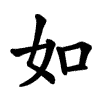Definify.com
Definition 2026
叫
叫
| ||||||
|---|---|---|---|---|---|---|
Translingual
| Stroke order | |||
|---|---|---|---|
| | |||
| Stroke order | |||
|---|---|---|---|

| |||
Han character
叫 (radical 30 口+2, 5 strokes, cangjie input 口女中 (RVL), four-corner 64000, composition ⿰口丩)
References
- KangXi: page 172, character 6
- Dai Kanwa Jiten: character 3240
- Dae Jaweon: page 383, character 2
- Hanyu Da Zidian: volume 1, page 573, character 2
- Unihan data for U+53EB
Chinese
|
simp. and trad. |
叫 | |
|---|---|---|
| alt. forms | 呌 | |
Glyph origin
| Historical forms of the character 叫
|
|---|
| Small seal script |
 |
| Characters in the same phonetic series (丩) (Zhengzhang, 2003) | |
|---|---|
| Old Chinese | |
| 艽 | *krɯːw, *qʰrɯːw, *ɡu, *ɡʷrɯw |
| 芁 | *kriːw |
| 荍 | *ɡiw |
| 叫 | *kiːws |
| 訆 | *kiːws |
| 嘂 | *kiːws |
| 收 | *qʰljɯw, *qʰljɯws |
| 糾 | *kɯw, *krɯwʔ |
| 朻 | *kɯw, *krɯw, *krɯwʔ |
| 丩 | *kɯw, *krɯw |
| 赳 | *krɯw, *krɯwʔ |
| 虬 | *ɡrɯw |
| 虯 | *ɡrɯw |
| 觓 | *ɡrɯw |
Pronunciation
- Mandarin
- (Standard Chinese, Beijing)+
- Pinyin:
- Zhuyin: ㄐㄧㄠˋ
- Wade-Giles: chiao4
- Gwoyeu Romatzyh: jiaw
- IPA (key): /t͡ɕi̯ɑʊ̯⁵¹/
-

- (Standard Chinese, Beijing)+
- Cantonese
- (Standard Cantonese, Guangzhou)+
- Jyutping: giu3
- Yale: giu
- Cantonese Pinyin: giu3
- IPA (key): /kiːu̯³³/
- (Standard Cantonese, Guangzhou)+
- Min Nan
- (Hokkien)
- Pe̍h-ōe-jī: kiò
- Tâi-lô: kiò
- Phofsit Daibuun: kioix
- IPA (Xiamen): /kiɤ²¹/
- IPA (Quanzhou): /kiɤ⁴¹/
- IPA (Zhangzhou): /kiɤ²¹/
- IPA (Taipei): /kio¹¹/
- IPA (Kaohsiung): /kiɤ²¹/
- (Teochew)
- Peng'im: giê3 / gio3
- Pe̍h-ōe-jī-like: kiè / kiò
- IPA (key): /kie²¹³/, /kio²¹³/
- Note: giê3 - Chaozhou.
- (Hokkien)
- Wu
- (Shanghainese)
- Wiktionary: qiau (T2)
- IPA (key): /t͡ɕʰiɔ³⁴/
- (Shanghainese)
- Dialectal data▼
| Variety | Location | 叫 |
|---|---|---|
| Mandarin | Beijing | /t͡ɕiɑu⁵¹/ |
| Harbin | /t͡ɕiau⁵³/ | |
| Tianjin | /t͡ɕiɑu⁵³/ | |
| Jinan | /t͡ɕiɔ²¹/ | |
| Qingdao | /t͡ɕiɔ⁴²/ | |
| Zhengzhou | /t͡ɕiau³¹²/ | |
| Xi'an | /t͡ɕiau⁴⁴/ | |
| Xining | /t͡ɕiɔ²¹³/ | |
| Yinchuan | /t͡ɕiɔ¹³/ | |
| Lanzhou | /t͡ɕiɔ¹³/ | |
| Ürümqi | /t͡ɕiɔ²¹³/ | |
| Wuhan | /t͡ɕiau³⁵/ | |
| Chengdu | /t͡ɕiau¹³/ | |
| Guiyang | /t͡ɕiao²¹³/ | |
| Kunming | /t͡ɕiɔ²¹²/ | |
| Nanjing | /t͡ɕiɔo⁴⁴/ | |
| Hefei | /t͡ɕiɔ⁵³/ | |
| Jin | Taiyuan | /t͡ɕiau⁴⁵/ |
| Pingyao | /t͡ɕiɔ³⁵/ | |
| Hohhot | /t͡ɕiɔ⁵⁵/ | |
| Wu | Shanghai | /t͡ɕiɔ³⁵/ |
| Suzhou | /t͡ɕiæ⁵¹³/ | |
| Hangzhou | /t͡ɕiɔ⁴⁴⁵/ | |
| Wenzhou | /t͡ɕiɛ⁴²/ | |
| Hui | Shexian | /t͡ɕiɔ³²⁴/ |
| Tunxi | /t͡ɕio⁴²/ | |
| Xiang | Changsha | /t͡ɕiau⁵⁵/ |
| Xiangtan | /t͡ɕiaɯ¹²/ | |
| Gan | Nanchang | /t͡ɕiɛu⁴⁵/ |
| Hakka | Meixian | /kiau⁵³/ |
| Taoyuan | /keu⁵⁵/ | |
| Cantonese | Guangzhou | /kiu³³/ |
| Nanning | /kiu³³/ | |
| Hong Kong | /kiu³³/ | |
| Min | Xiamen (Min Nan) |
/kiau²¹/ /kio²¹/ |
| Fuzhou (Min Dong) | /kiɛu²¹²/ | |
| Jian'ou (Min Bei) | /kiau²⁴/ | |
| Shantou (Min Nan) | /kio²¹³/ | |
| Haikou (Min Nan) | /kio³⁵/ |
| Rime | |
|---|---|
| Character | 叫 |
| Reading # | 1/1 |
| Initial (聲) | 見 (28) |
| Final (韻) | 蕭 (93) |
| Tone (調) | Departing (H) |
| Openness (開合) | Open |
| Division (等) | IV |
| Fanqie | 古弔切 |
| Reconstructions | |
| Zhengzhang Shangfang |
/keuH/ |
| Pan Wuyun |
/keuH/ |
| Shao Rongfen |
/keuH/ |
| Edwin Pulleyblank |
/kɛwH/ |
| Li Rong |
/keuH/ |
| Wang Li |
/kieuH/ |
| Bernard Karlgren |
/kieuH/ |
| Expected Mandarin Reflex |
jiào |
| Baxter-Sagart system 1.1 (2014) | |
|---|---|
| Character | 叫 |
| Reading # | 1/1 |
| Modern Beijing (Pinyin) |
jiào |
| Middle Chinese |
‹ kewH › |
| Old Chinese |
/*kˤewk-s/ |
| English | shout |
Notes for Old Chinese notations in the Baxter-Sagart system: * Parentheses "()" indicate uncertain presence; | |
| Zhengzhang system (2003) | |
|---|---|
| Character | 叫 |
| Reading # | 1/1 |
| No. | 6918 |
| Phonetic component |
丩 |
| Rime group |
幽 |
| Rime subdivision |
3 |
| Corresponding MC rime |
叫 |
| Old Chinese |
/*kiːws/ |
Definitions
叫
- to be called
- to call; to name
- to call (someone)
- 叫警察 ― jiào jǐngchá ― to call the police
- to cry; to shout
- 狗叫 ― gǒujiào ― bark
- to hail; to greet
- to ask; to order
- to hire; to call (a taxi); to order (in a restaurant, in a shop)
- used in a passive sentence to introduce the agent; by
Usage notes
- (to call, to be called): When used for a person, 叫 is generally followed by one's given name or full name, as in English.
Synonyms
Compounds
Derived terms from 叫
Japanese
Kanji
叫
Readings
- Goon: きょう (kyō), (historical) けう (keu)
- Kan’on: きょう (kyō), (historical) けう (keu)
- Kun: さけぶ (叫ぶ, sakebu)
Compounds
Korean
Hanja
叫 • (gyu) (hangeul 규, McCune-Reischauer kyu)
- This term needs a translation to English. Please help out and add a translation, then remove the text
{{rfdef}}.